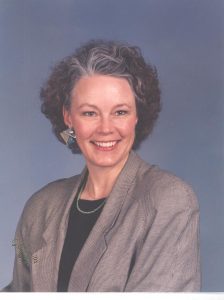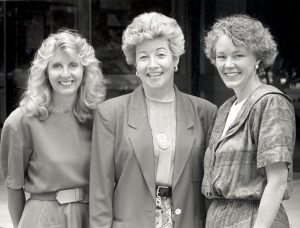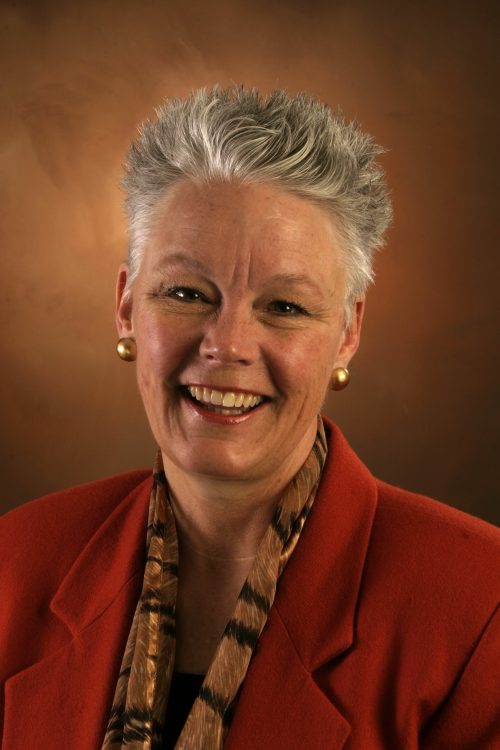By Laurie Laker ’12
Cresting the hill of Mesa Road on Colorado Springs’ west side, it’s not hard to see why Laurel McLeod ’69 has long been in love with CC and the college’s stunning location. Her house was designed by Elizabeth Wright Ingraham, a local architect and pioneer of CC’s long-running summer “Crossroads” program, which brought international students to CC for an immersive summer experience. The CC connection, then, exists in both the personal and professional for McLeod.
Moving to Colorado Springs from the Bay Area when Laurel was 9, the McLeod family settled into a post-war community that was growing and on the cusp of major changes. Her parents’ “college” education was the Great Depression itself.
When it came to choosing a school district, the McLeod parents chose Cheyenne Mountain, the best prep school in the city at the time. The act of choosing plays a big role in Laurel McLeod’s arrival at CC.
“My parents said I had to go to CC. It was the 1960’s, so naturally I went to DU instead! That was a secret when I started at CC,” she laughs.
DU didn’t last. She followed her younger brother Scott McLeod ’71 to CC, after a year studying in Switzerland and the French Riviera, McLeod found CC to be an “entirely different place, so challenging.”
“CC became interlaced with my life, from when I was a student and through my career as an administrator, and now as a retiree” she says.
“It was such a thrill, to take the jump into such a rich, intellectually stimulating life. It’s a life that I’ve loved since I first set foot on the college campus.”
A French major at CC, McLeod took flight. Liberated by the exploratory culture of the liberal arts, she graduated cum laude, joining the Phi Beta Kappa Society, the oldest honor society for the liberal arts and sciences in the United States.
“I was SO naïve. When I called my mother to ask about Phi Beta Kappa’s $15 membership fee, she burst into tears – knowing before I did, the honor it represented.”
As an upperclassman, McLeod moved – “illegally, by CC rules” she adds – away from campus, got a part-time job, and commuted to and from work using the local bus network. As she puts it – “it was the 1960s, and I thought campus living restrictions were too confining!”
After her graduation, McLeod taught English at Lycee Marie Curie in Tarbes, France, then French at Cheyenne Mountain High School for six years. Enrolled in CC summer session’s Master in Arts of Teaching French, she completed the MAT degree in 1975.
Remaining involved in CC Summer Session, she assisted in the Francophone Institute. Then she was invited to join the college full-time in 1976 as the assistant dean of Summer Session.
McLeod was uniquely positioned to take on an impactful and important role at the college. Her promotion to dean of women in 1977 meant a return to a changed, still evolving, college.
“In the 70’s CC was adapting to the Block Plan and struggling with seismic changes in student life overall.”
Back in 1964 when I went to college, women students had been treated quite differently from men: They couldn’t wear jeans to class, dormitory curfews were strictly enforced, parental permission was required for weekend leave,” she explains.
“Health center records were not private, and abortion was still unavailable. In fact, a friend of mine from high school helped run cars with pregnant women down to Mexico where it was legal.”
“Today the ’60s look free,” she adds, “with our flower power memories, but it takes a long time for structures in societies – and in colleges – to adapt.”
As the last person to hold the title of dean of women in the college’s history, McLeod and her work went a long, long way to making just those changes in the college and its structures.
“When Lew Worner, the college president at the time, called me into his office to offer me the role, it was a secret. I was thrilled, but once the news spread it took a lot of managing expectations and reactions to smooth things over.”
“I was a young appointee to the position,” she explains when asked why things needed smoothing over. “Students had not been included in my selection! In fact, they weren’t even informed of the departure of my predecessor Dr. Elizabeth (Lib) Sutherland. Student involvement in decisions that directly affect them was a logical, but new, modus operandi. The times brought a lot of change for the campus to take in, in a short period of time.”
Her work was never dull, addressing everything from student life policy to individual problems and crises to campus adaptations.
“Work in student life is largely personnel work,” she explains. “It is at a crux of values issues, things people may not want to hear, and process. My decisions were sometimes not popular, but I always tried to be fair and ethical.”
The college relaxed over time. Dormitory rules for women were abolished, and co-ed halls introduced, the dress code and curfews went away, Title IX changes were implemented – and the community was safer the more integrated it became. McLeod’s role evolved as well. She transitioned into the dean of students role in 1983, and then to vice-president for student life in 1991.
Accompanying a growing career, McLeod also nourished her passions for the outdoors, community service, and further education. An avid outdoorswoman, backcountry skiing and hiking Colorado’s 14’ers, McLeod’s membership in the Colorado Mountain Club was something of a no-brainer.
Memberships with perhaps less-glamorous views but just as much impact across the community include the League of Women Voters, presidency of the Colorado-Wyoming Association for Women Administrators and Counselors, and selection to the Women’s Forum of Colorado.
In 1990, McLeod attended Harvard University’s Management Development Program, a two-week seminar for higher education administrators addressing leadership, governmental, and legal trends in higher education.
Though she retired from the college in 2007, McLeod has maintained a strong bond with CC ever since she set foot on the campus as a student in 1969. Her niece Dana McLeod ’04 and daughter Kelsey McLeod Wright ’08 join her in gratitude to CC.
In 2011, she and her husband, Jim Allen, donated the 8-foot-tall, brightly painted butterfly sculpture that sits at the Colorado College Children’s Center. As a member of the first committee that sought to establish an on-campus child care center, a single mother, and the first CC woman administrator to continue working after having a baby, McLeod recognized the need for such a center as a vital part of the college’s future.
Now 70, she and her family continue to volunteer in the Colorado Springs community – with the Colorado Springs Rotary Club, the C.S. World Affairs Council, the Palmer Land Trust, and various women’s groups. Travel, both domestic and international, continues to thrill her.
“I’m actually going to France again this fall,” she casually mentions. “I love to keep speaking French, to visit my friends from when I lived and worked abroad.”
“That’s CC’s great legacy with me,” she says.
“Those connections and that community – I still get great intellectual stimulation from the college today, the events it hosts. It’s improved so much since the ’60s, from the Block Plan to its reputation, but the core of its identity as a liberal arts educational institution remains the same.”
One thing is for certain – CC would not be the place it is today without pioneering and fearless graduates, and administrators, like McLeod.
Please, share your anecdotes and recollections about this wonderful member of our community!








19 Responses to Laurel McLeod ’69, MAT ’75
This was a wonderful piece!
This is wonderfully written piece about a fine person who I’ve had the privilege of knowing since about 1971 (I’m CC 1975 – and have had close ties with the college and Laurel’s family ever since.)
Kudos to Laurel!
Yes, I remember you Mark and Laurel. I was in the Hanya Holm Dance program a number of years and then an undergraduate. Majored in Art History…loved every it all. It was a small town then.
Yes, this article on Laurel McLeod was a wonderful summary of her story and many contributions at and to Colorado College. Laurel, you make all of us who know you very proud of you and your record of accomplishments at CC for over 34 years!!!
James Allen
Well said!
Well played Mormor…..
Three cheers for Laurel!! What a treasure!
Laurel has made a significant contribution to CC and campus life. I first met her the summer before I started at CC on a boating/camping trip with family and friends. By sharing her life stories, I learned about what my future education might mean to me. That fall, I entered more confidently. During my 4 years I interacted with her a bit in her role as Dean of Women, and in my final year she provided invaluable help so that I could continue my studies. I am most grateful.
I enjoyed reading this well-deserved profile.
Jane Wilson
I was so pleased to see this long-overdue article on one of the most important people at the College! How well I remember her support when my sister, Kathy died not long after her graduation in 1980. Still to this day, almost 40 years later now Laurel remembers her to me. I am sure that there are many other alumni who share other personal situations with her. Thank goodness that she chose CC over DU! The College has been very fortunate to have such a personable individual.
Laurel helped make CC a special place for all of us. I am thankful for her dedication as an educator and administrator. What I remember most clearly is how accessible and approachable she was, as well as creative and all-around wonderful. Thank you Laurel. You made a difference in my life, and in the lives of so many others.
Great story. Well done, Laurel.
-Michael Kelly “69”
Quels beaux souvenirs d’une amie extraordinaire!??
What a wonderful tribute to a special woman! Such a trail blazer! And beautiful to boot! I’m so privileged to have had the opportunity share time in her life as a colleague at Colorado College. And I’m even luckier to have remained good friends and ski buddies to this day. And I love that 1990s photo of the three new female VPs — great hair!
Laurel is a remarkable person. She exemplifies the CC spirit in the way she thinks and acts. In Rotary, she has always had a leading role and communicates with remarkable clarity and depth. I am lucky to call her a friend and mentor. She made decisions as VP for Student Life that were fair, truthful, not always popular but always with integrity. I remember some of her decisions regarding issues between students that were surprising and beneficial both to the students involved and to the college, even if not recognized as such at the time. Skiing accidents and injuries have never stopped her positive attitude and resilience. As she always says, “Cheers” – this time to Laurel herself.
As my peers and I are about to celebrate our CC 40th of course the mood turns reflective … Laurel, you were and continue to be an inspiration to so many! Thank you for your dedication to the broader community. It is an honor to know you! Wonderfully done article, and the pictures are priceless …
Do you (Laurel) perhaps recall being ‘enticed’ by the CCMC (CC Mntn Club) at the CC freshman ‘recruiting’ tables, to join us for the first couple of our off campus trips to introduce fresh-persons to the glories of Colo Rockies adventures? As we recall, you forked over the obligatory $10, which, along with ‘dues’ from fellow freshmen, constituted most of our operating capital for the upcoming year. As we recall, you came along for our first two trips, a local hike, &, our first ‘serious’ hike up Hallets, but we didn’t see you after that. Nice to hear you ‘came back’ to the mountains via the CMC, perhaps in recall of our efforts in the CCMC to get freshmen ‘excited’ about our Colorado Mt. resources. Steve & Sheri Specht, Pres. & Secretary of the Colo College Mntn Club, ‘66 – ‘67.
Great long overdue tribute. Dean McLeod has given much to CC and this community. I hope to parler with you soon Laurel!
Great piece. She was great to me during my time at CC. I had a horrific ski accident, and she was a key to the CC community rallying behind me and my family to get me back on track after being in the hospital for a month. I even named my first daughter with Laurel as her middle name. She speaks French as well though she didn’t go to CC(Northwestern), and we both spend a lot of time in Paris. Let me know when you will be in Paris, as I would love to have lunch with you.
Laurel was a beacon to me when I became VP of Student Affairs at Southwestern U in Texas. I found this article as I am spending a month in CS, want to thank her for her example!